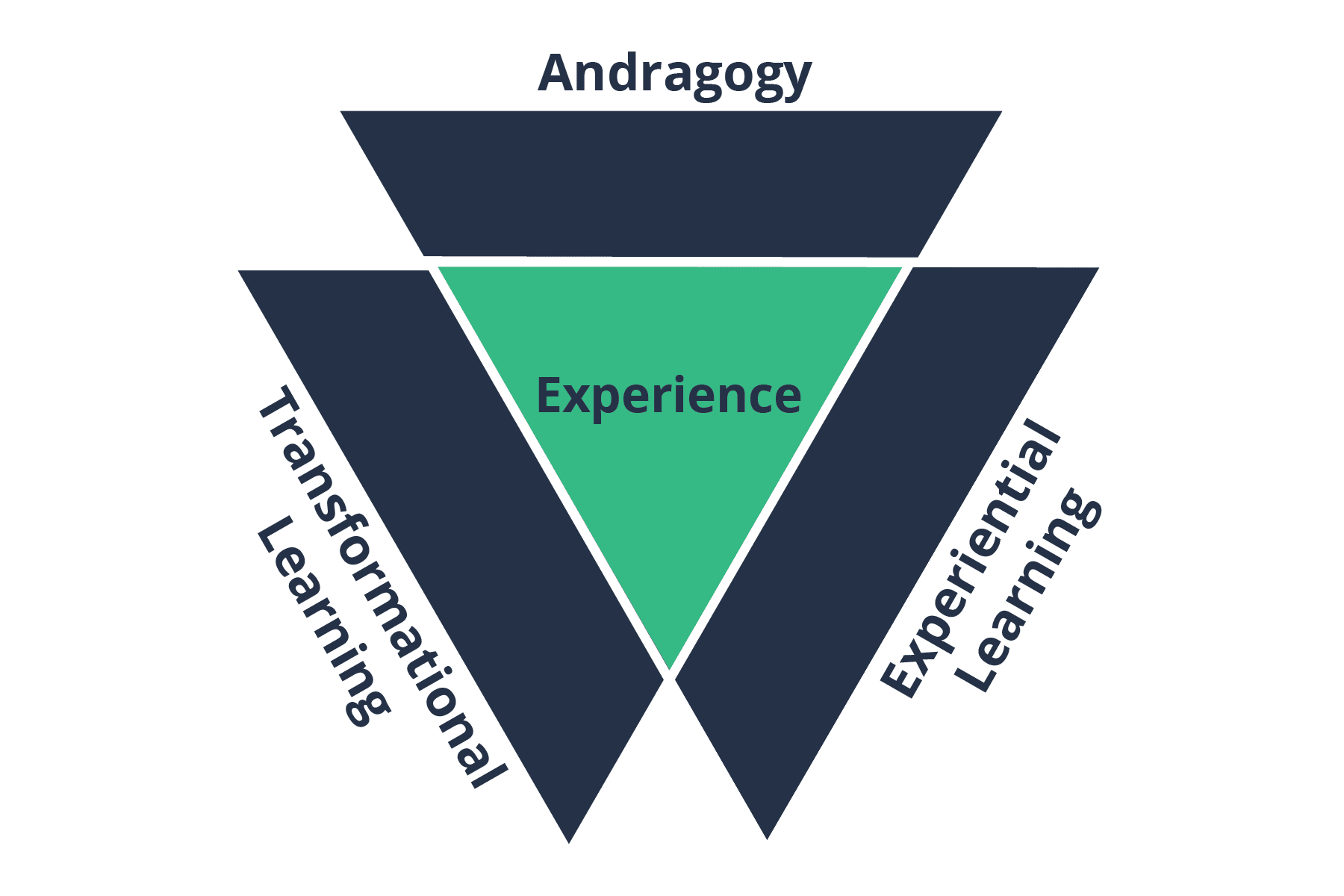Training Through Experience-Driven Adult Learning Theories

There is a reason why corporate training is different than traditional education. An adult learner, especially in the workplace, has a much different learning motivation, learning environment, and learning circumstances. A workplace cannot guarantee most of the underpinnings of traditional education: a required allotment of time, access to a broad scope of subject matter, focus on the knowledge transfer aspect of the experience, a dedicated instructor to design and provision the learning.
Where education is geared toward learning, corporate training focuses on skill development. Where education focuses on theoretical, corporate training needs to produce practical results.
To accomplish corporate training goals, learners need to be universally engaged and motivated. There is a commonality that exists between all employees that can act as a unifying element on which to center training around. Something that everyone in the workplace has in common is experience.
We can use adult learning theories that utilize experience as a guide to create workplace training.
Adult Learning Theory #1: Andragogy
The Andragogy theory, developed by Malcolm Knowles in the 1970s, centers around how adult learners function and how they use their experiences to navigate learning.
Knowles defines six assumptions that relate to how and why learning occurs in adults.
- Need to know: Adults are resistant to learning simply for the sake of learning. As an active participant in the learning experience, they need to contextualize why they are being asked to learn. The intent of the learning matters.
- Foundation: Adults bring with them their cumulative set of experiences which will set the basis for their learning. Using these past experiences, including failures or errors, adults can evaluate new learning against existing understanding to alter old ideas, or create new ideas.
- Self-concept: Adults need to be in control of the learning experience. This includes being an active participant in the planning of the learning, controlling the pace and flow of information, and being a consideration in the evaluation of the training.
- Readiness: Adults gauge readiness to learn based off of the immediate relevance of how the learning will impact their experience at work or at home.
- Orientation: Adults learn by focusing on a problem and solving it, rather than trying to wrap their heads around a hypothetical. Placing themselves within the problem provides relevance and offers a glimpse of what they will be able to accomplish with newly acquired knowledge.
- Motivation: Adults can provide their own internal motivation for learning if they understand the benefits of the learning experience.
Tap into the adult learner’s experiences, and allow them to leverage what they already know to self-navigate through learning topics that can produce a tangible end-result.

Adult Learning Theory #2: Experiential Learning
Indicative of its name, Experiential Learning is the process of living the learning rather than having the concepts of the learning related to you. For adults in particular, no other form of input can take the place of being immersed in the learning experience.
David A. Kolb’s Experiential Learning Model (ELM) breaks down four cyclical stages of experiential learning.
- Concrete Experience (CE): Physical participation in situations or simulations, as well as feeling the emotional effects of actions creates learning that is cemented in the adult learner’s mind.
- Reflective Observation (RO): To acquire new knowledge, or iterate on prior knowledge, the concrete experiences need to be followed by periods of reflection. This allows the adult learner to extract meaning from what they have just physically experienced.
- Abstract Conceptualization (AC): Because of the adult learner’s need to understand relevance, the meaning that is derived from concrete experienced is then synthesized and put into the perspective of their reality at large. The learner in this stage is creating their own understanding of concepts.
- Active Experimentation (AE): The next stage allows the learner to test the concepts they have developed in the previous stage. The adult learner is able to apply their understanding against real-world situations. The experimentation stage creates concrete experiences, which begins the cycle all over again.
Create situations and scenarios that allow the adult learner to physically and emotionally experience the learning, give them space to take a step back and process what they just experienced to formulate a new understanding, then provide the freedom for them to test out that new understanding.
Adult Learning Theory #3: Transformational Learning
As early as 1978, Jack Mezirow began working on the theory that learning is a result of an event which challenges prior understanding. The learner is taken through not only a transformative experience, but also a subsequent series of steps that lead them to a place where their new understanding is reintegrated into their life. These “Eureka!” moments represent a true transformation in the learner’s perspective.
The perspective shift is explained by Mezirow as follows:
- Disorienting dilemma
- Self-examination
- Sense of alienation
- Relating discontent to others
- Explaining options of new behavior
- Building confidence in new ways
- Planning a course of action
- Knowledge to implement plans
- Experimenting with new roles
- Reintegration
Practically speaking, the adult learner experiences a dilemma that shakes a belief held dear to them. Because it is an unsettling feeling to learn that your prior belief is wrong, the learner struggles to grasp the ramifications of this revelation. They enter a state of internal exploration as well as validation against the understanding of others.
From there, the adult learner begins to formulate an understanding of what the new belief means to them and their life. They draw conclusions to establish a sense of relevance revolving around the new belief, and form an idea of the outcome of developing their transformed understanding.
With an end result in sight, the learner can now focus on how to put the new understanding into practice – testing as they go – until it is a fully embedded part of their life. The entire process is an experience with the learner at the center.
Challenge the learner’s beliefs, allow them to have epiphanies, and facilitate a transformation of perspective.
Experiences are a common ground in an ever-increasingly diverse setting that most workplaces have become. Experience can be the starting point of the learning, it can be the main source of engagement for the adult learner, and it can also be the process by which the learning occurs.
